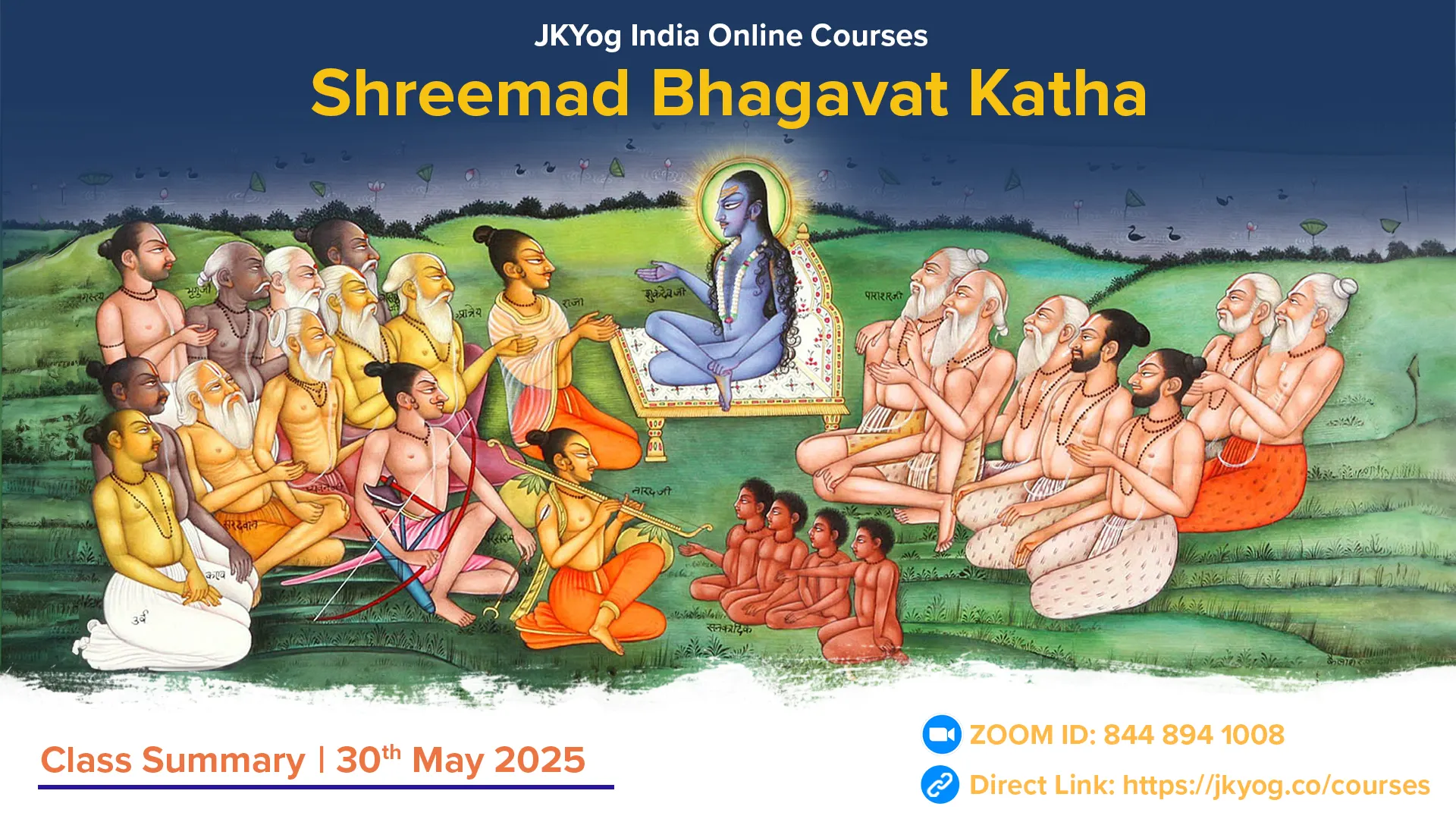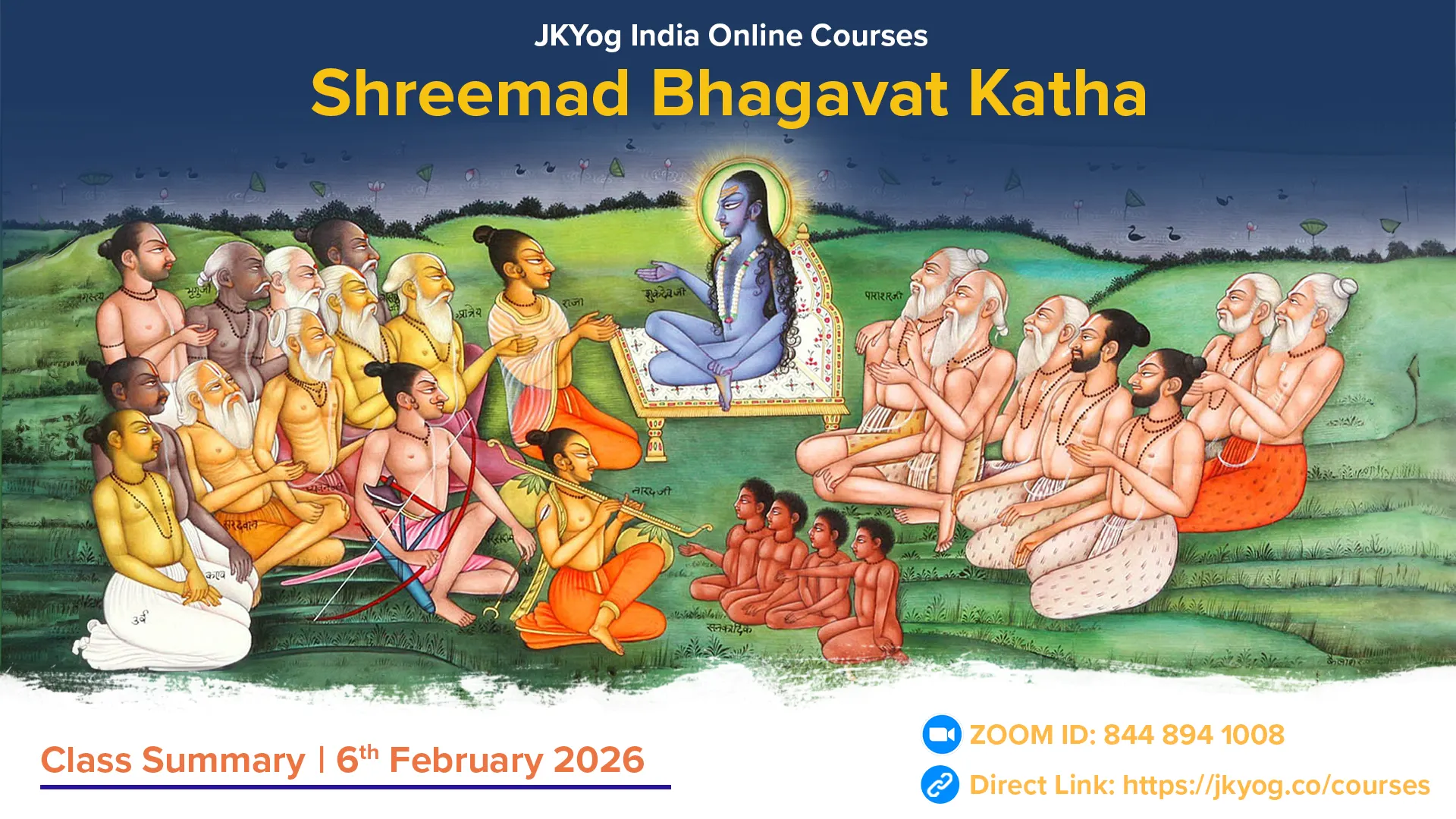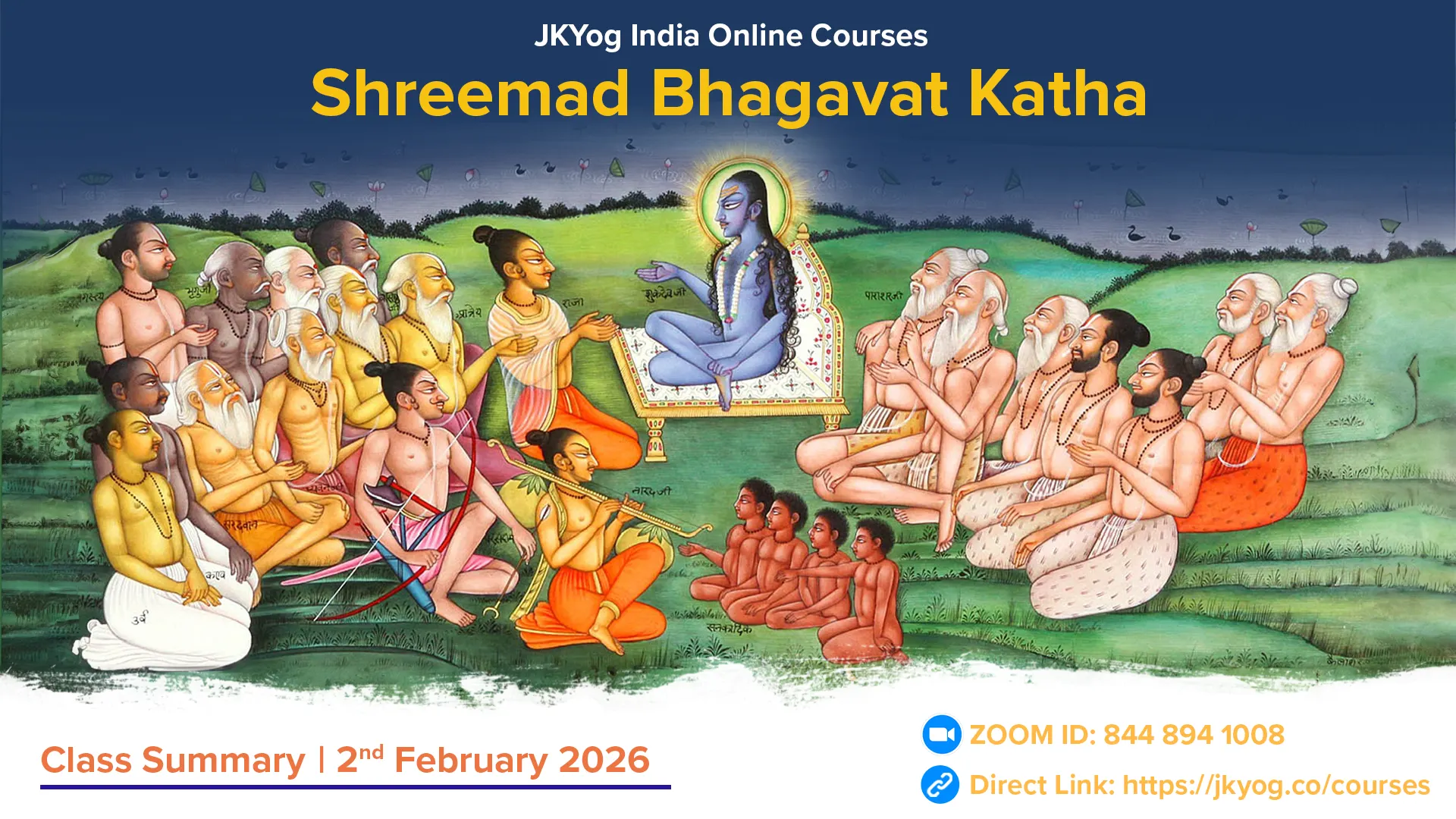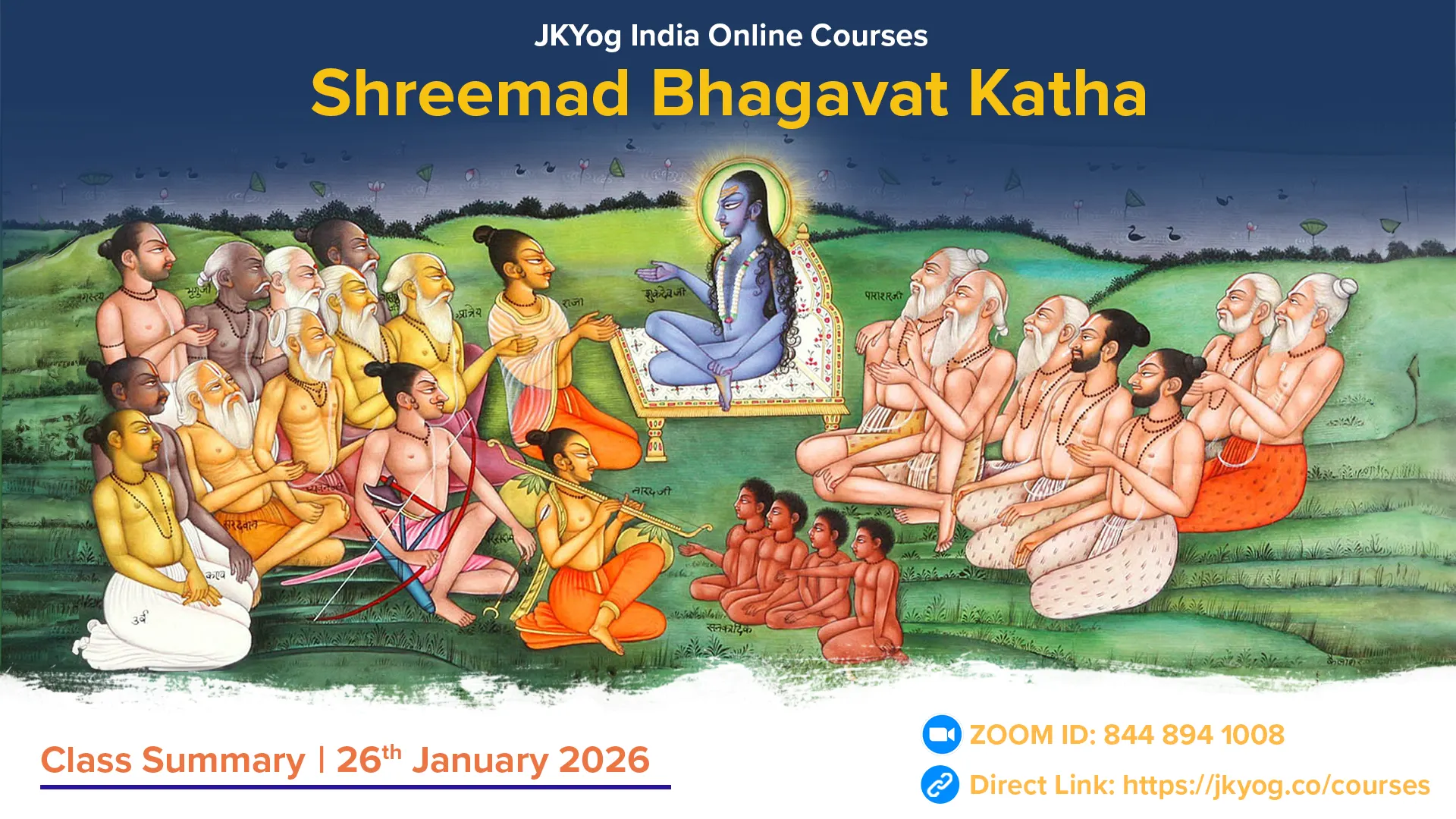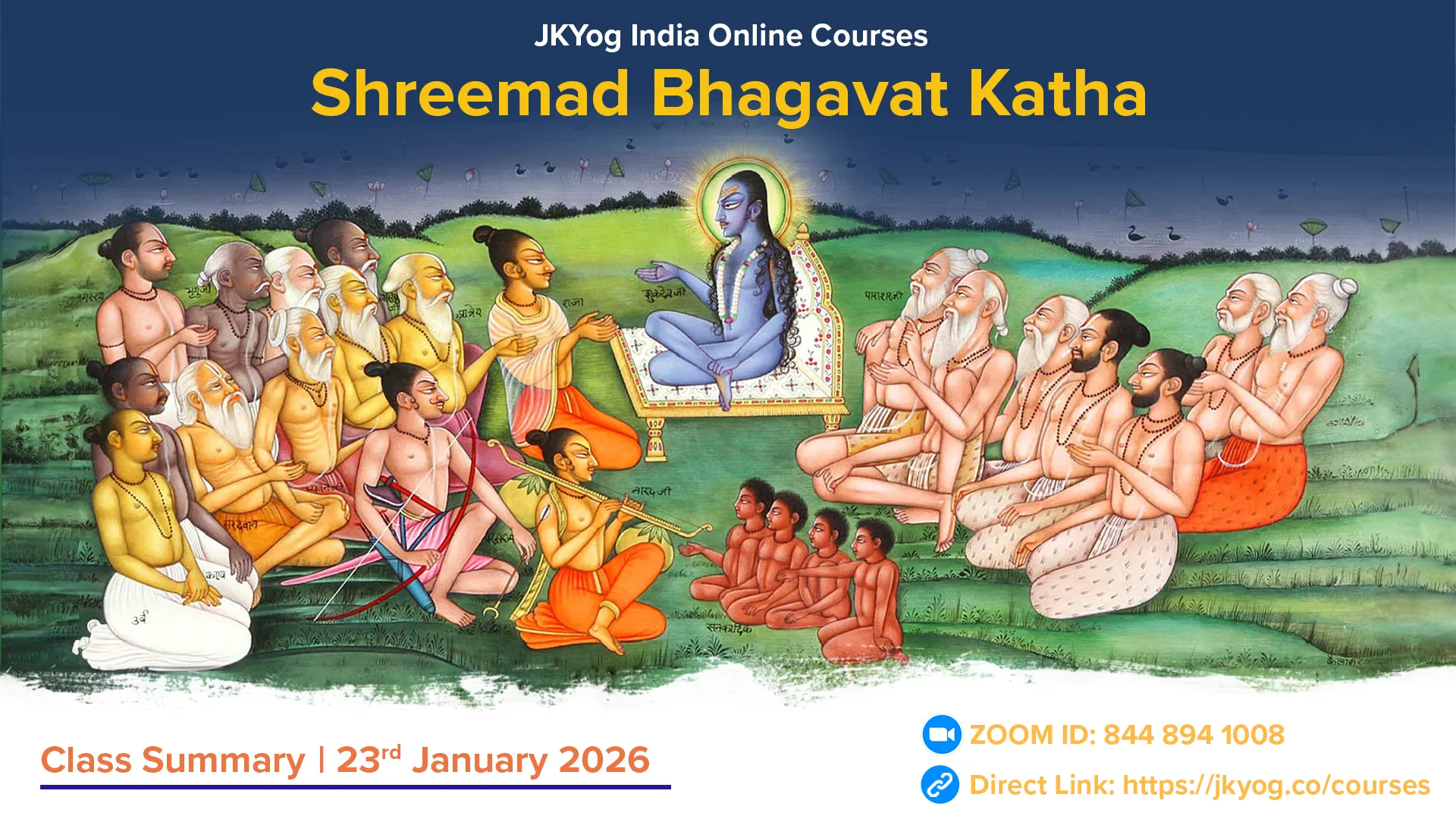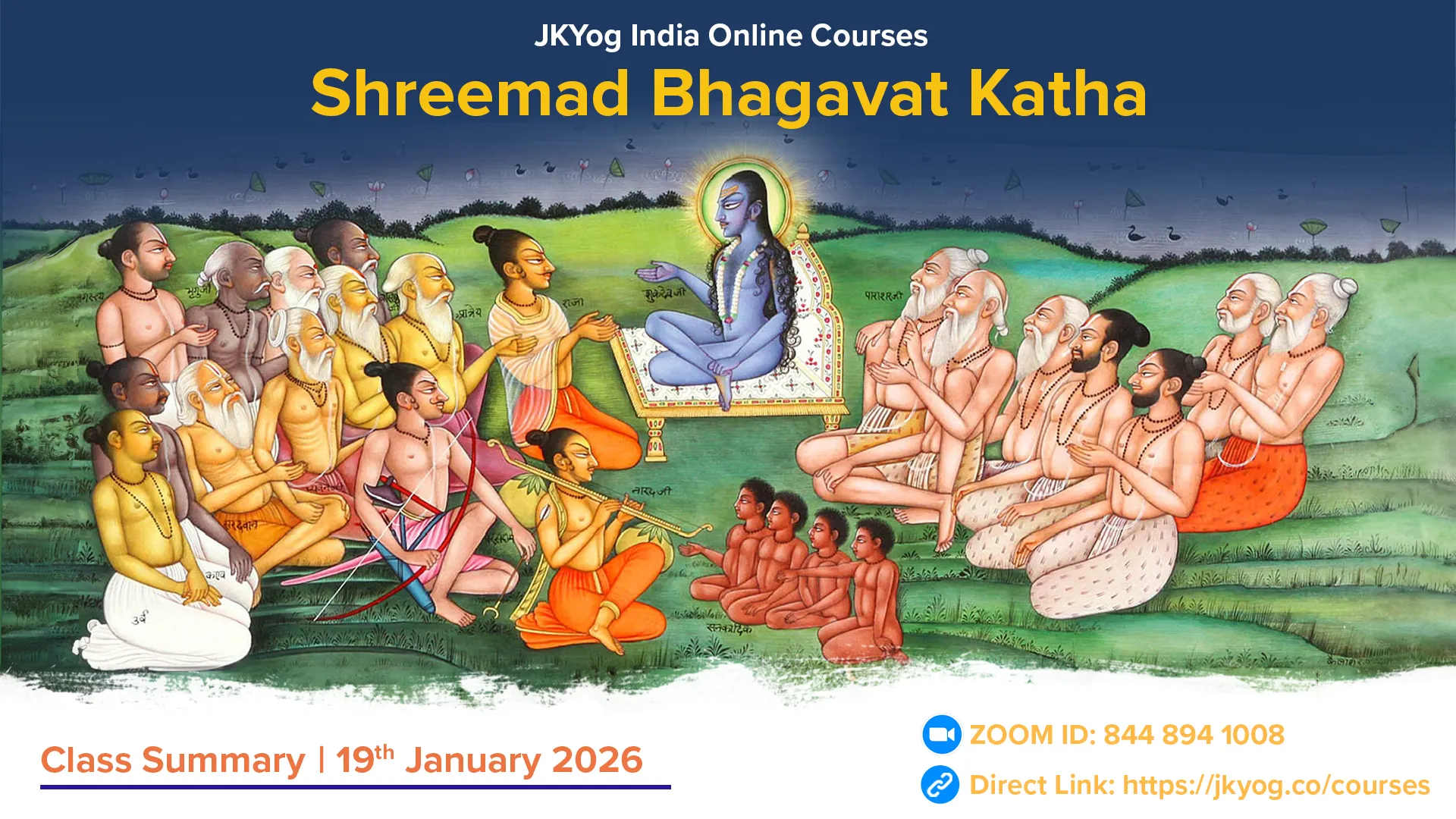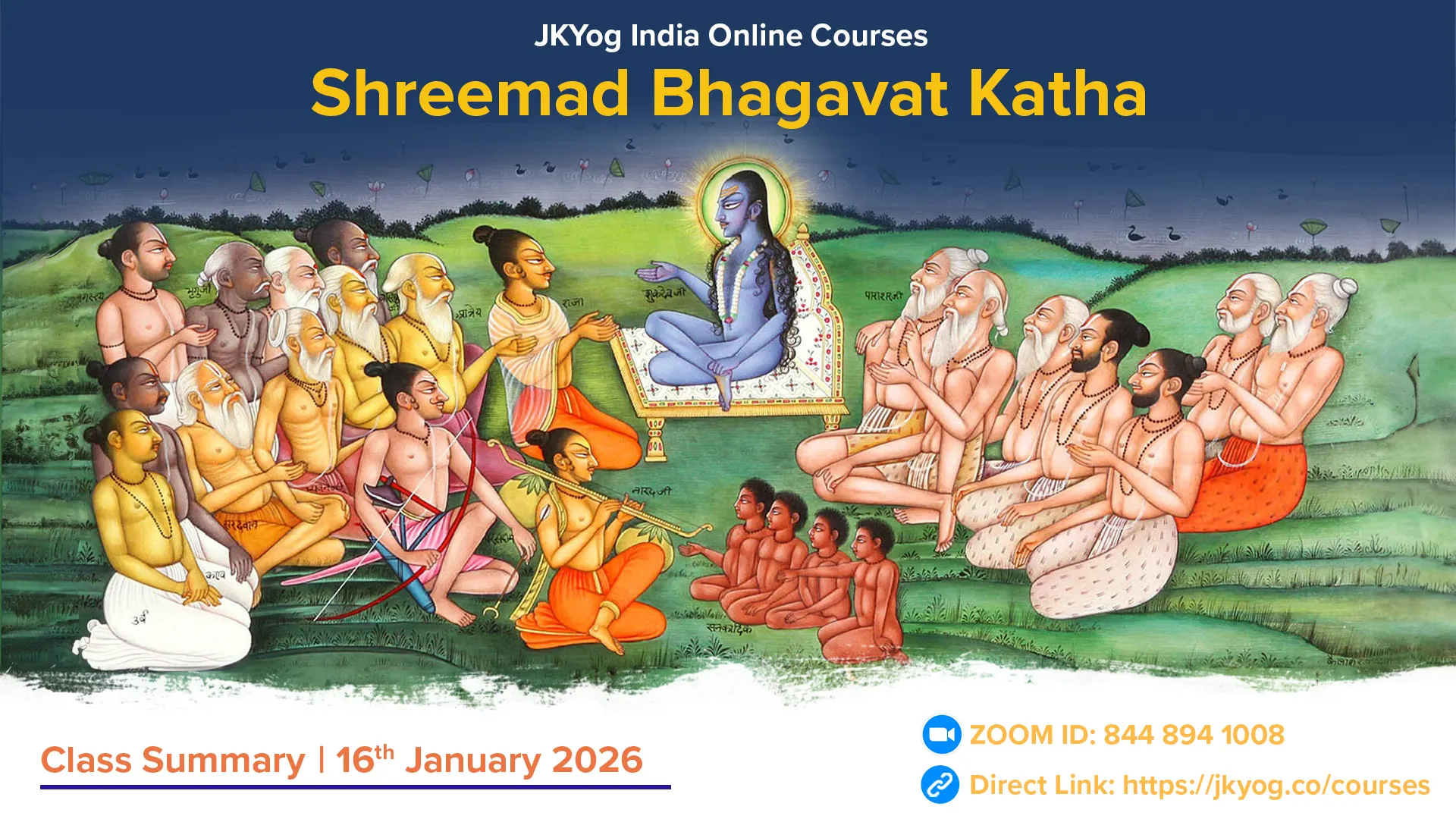Shreemad Bhagavat Mahapuran- Canto: 8, Chapters: 1- 4
King Parikshit humbly requested Shukadevji that he had already heard the description of the lineage of Swayambhuva Manu, in which the Prajapatis like Marichi continued the family tradition through their daughters. Now, the king wished to hear the stories of the other Manus as well. He specifically requested that Shukadevji describe in detail the various incarnations (avatars) that Bhagwan had taken in different Manvantaras (eras of Manus), along with the divine pastimes (leelas)—whether they occurred in the past, are happening in the present, or are yet to happen in the future.
To this, Shukadevji explained that six Manvantaras had passed in this Kalpa so far. He had already narrated the details of the first Manvantara—that of Swayambhuva Manu—in which the gods and other beings were created. In that same Manvantara, Bhagwan appeared from the womb of Akuti as Yajna Purush and gave the teachings of Dharma. He also incarnated as Kapil from Devahuti to impart the teachings of Jnana (divine knowledge).
Swayambhuva Manu, having become detached from all worldly enjoyments, renounced his kingdom and went to the forest with his wife Shatarupa to perform austerities. Standing on one leg on the banks of the Sunanda River, he performed severe penance for a hundred years. One day, as he was deeply absorbed in meditation and chanting the Vedas, suddenly a group of hungry asuras and rakshasas attacked him to devour him. Seeing this, the omniscient Bhagwan Yajna Purush arrived there along with His sons, the deities known as Yam—and slew those asuras. Afterwards, He was established in the position of Indra and began to govern Swarg (heaven).
Second Manvantara:
- Manu's name was Swarochisha. He was the son of Agnidev, and his sons included Dhuman, Sushen, Rochishman, and others.
- The Indra of that Manvantara was named Rochan. The gods were the Tushitgan, and the Saptarishis were sages like Urjastambh.
- In that Manvantara, Bhagwan incarnated as Vibhu from the womb of Tushita, the wife of the sage Vedashira. He remained a brahmachari (celibate) for life, and due to His influence, 88,000 sages also adopted the vow of celibacy.
Third Manvantara:
- Manu's name was Uttam. He was the son of Priyavrat. His sons were Pavan, Sanjay, Yagyahotra, and others.
- The Indra of that Manvantara was Satyajit. The gods were Satya, Vedashrut, Bhadra, etc., and the Saptarishis included Pramad and others (sons of Vashishthaji).
- In this Manvantara, Bhagwan took birth as Satyasen, the son of Dharma and Soonrita. Along with Indra Satyajit, He destroyed the wicked Yakshas, Rakshasas, and Bhutganas (ghostly beings).
Fourth Manvantara:
- The name of the Manu was Tamasa. He was the brother of Uttam Manu. He had ten sons, including Path, Khyati, Nara, Ketu, and others.
- The Indra of that Manvantara was Trishikh. The gods were Satyak, Hari, Veer, etc., and the Saptarishis included Jyotirdham and others.
- In this Manvantara, the group of deities known as Vaidhriti preserved the Vedas.
- Bhagwan incarnated as Hari, born to Harini, the wife of the sage Harimedha, and He rescued Gajendra (the elephant king) from the clutches of a grah (crocodile).
The Battle Between Gajendra and the Crocodile
King Parikshit asked Shukadevji with great curiosity, “O revered sage, I wish to hear how Bhagwan rescued Gajendra the elephant from the jaws of the crocodile.”
Shukadevji replied:
In the Kshirsagar (Ocean of Milk), a magnificent mountain named Trikoot stood ten thousand yojanas (approx. 80,000 miles). Its many peaks were studded with silver, gold, and jewels, lighting up the skies and all directions. Beautiful waterfalls cascaded down its slopes, and the mountain was covered in lush greenery, vines, and divine gardens filled with vibrant flowers. Celestial beings like Siddhas, Gandharvas, Kinnaras, Nagas, and Apsaras would frequently roam and delight in its beauty.
At the base of this mountain lay a divine garden called Ritumaan, owned by Varundev, where celestial women played. It had trees heavy with fruits and flowers, and a serene lake filled with golden lotuses. The water was home to birds, fish, and turtles, and the scented breeze brought great joy to all who experienced it.
In the dense forests of that mountain lived a mighty elephant named Gajendra. He was the king of a vast herd that included many elephants, she-elephants, and calves. Merely his scent would send lions, tigers, rhinos, snakes, and other ferocious animals fleeing. On the other hand, smaller animals like deer, pigs, and monkeys roamed freely and fearlessly under his protection.
One particularly hot day, the herd was tormented by thirst. From a distance, Gajendra sensed the cool and fragrant breeze coming from the lake and marched swiftly in that direction with his herd. Upon reaching the lotus-filled lake, he quenched his thirst, bathed, and felt rejuvenated. Pleased and comforted, he began acting like a householder, attached and affectionate, bathing his mate and children with his trunk and playing joyfully.
But just as he was immersed in pride and pleasure, fate struck. Suddenly, a powerful graah (crocodile), driven by anger, grabbed his leg. Taken by surprise, Gajendra struggled with all his might to break free. Despite tremendous effort, he couldn’t escape. The rest of the elephants—his queens, calves, and companions—panicked upon seeing their king being dragged underwater. They screamed in distress and tried desperately to pull him out, but failed.
A fierce struggle began—Gajendra and the crocodile fought with all their strength. At times, Gajendra pulled the crocodile toward the shore; at other times, the crocodile dragged him deeper into the water. They remained locked in combat in the lake.
Shukadevji said—“O Parikshit! This battle went on for a thousand years. Neither gave up. Even the gods watched in awe. Eventually, Gajendra's strength waned due to prolonged immersion in water. He grew weak and discouraged. The crocodile, being a creature of water, only grew stronger with time and now began pulling Gajendra more forcefully.
Thus, proud Gajendra found himself in deep crisis, utterly unable to free himself. After much contemplation, he concluded, ‘This crocodile is no ordinary creature—it is fate itself, a noose created by the Divine. If even other mighty elephants could not save me, how will these helpless she-elephants rescue me?’
He realised—‘There is only one hope left for me. I surrender to the one and only refuge of the entire creation—Bhagwan. Kaal (time/death) is all-powerful, always chasing like a venomous snake to devour everything. Whoever takes shelter in Bhagwan out of fear of this Kaal is always protected by Him. He alone is the ultimate saviour. Now, I surrender solely unto Him.’”
Praise of Bhagwan by Gajendra (Gajendra Moksha Stotram)
Shree Shukdevji says:
Parikshit! With firm determination and a focused mind in his heart, Gajendra began to praise Bhagwan by chanting the excellent hymn he had learnt in his previous birth.
Parikshit! With firm determination and a focused mind in his heart, Gajendra began to praise Bhagwan by chanting the excellent hymn he had learnt in his previous birth.
- Gajendra said:
I bow to Bhagwan, who is the fundamental cause of the entire universe. He dwells in the hearts of all beings in the form of Purush (the cosmic being) and is the Lord of the whole creation alone. Because of Him, this world appears conscious and active. I meditate on Him with love. - This entire universe is established in Him, visible through His existence. He Himself pervades this creation and manifests as it, yet He remains completely beyond nature and the world. He is the Self-luminous, self-realised Supreme Soul — I seek refuge in Him.
- This world exists in His Maya (divine illusion) — sometimes visible, sometimes hidden — yet the Supreme Soul always remains an impartial witness. He is the root of all, even His own cause; there is no cause beyond Him. He is beyond all causes and actions — may He protect me.
- When dissolution (Pralaya) occurs, worlds, deities, and their causes perish, leaving only dense darkness; even then, that infinite Supreme Soul remains, transcending all — may that Lord protect me.
- His divine plays (Leelas) are mysterious and unknowable. He assumes many forms, like a drama; neither gods nor sages can fully comprehend His true nature. How can anyone else? May He protect me.
- Great souls, to have His vision, renounce all attachments in the world, observe vows like Brahmacharya (celibacy), and by seeing the soul within all beings, work for the welfare of all. That omnipotent Lord, the God of sages, is my refuge.
- He has no birth, actions, name, or form — so how can qualities and faults be imagined in Him? Yet by His Maya, He assumes these and creates and destroys the universe. I bow to that infinitely powerful Supreme Soul.
- Though formless, He is many-formed; His works are wondrous — I bow to His feet. He is Himself the light and the witness of all — I salute Him. He is beyond mind, speech, and intellect — such a Supreme Soul I repeatedly bow to.
- By renunciation of action or surrender, those wise souls who purify their hearts and attain Him — they are eternally free, of the nature of supreme bliss and knowledge, and capable of liberating others — I bow to that Lord.
- Who embody the three gunas (qualities) — Sattva (pure), Rajas (active), and Tamas (inert) — residing in peaceful, fierce, and deluded states respectively, they are the undifferentiated, impartial, and knowledge-filled Lord. I repeatedly bow to them. You are the Lord of all, knower of all fields, and the all-witness — I salute You.
- You Yourself are the cause — You are the root form of Purush and Prakriti (premordial nature) — I repeatedly bow to You. You perceive all senses and their objects, are the basis of all perceptions — from Your existence, this world of Maya appears — You shine in all — I bow to You.
- You are the cause of all, yet Yourself causeless — and still without any defect — hence You are a unique cause — I repeatedly bow to You.
- Just as all rivers merge into the ocean, You are the essence of all Vedas and scriptures — You are the embodiment of liberation — saints seek refuge in You — I bow to You.
- Just as fire is hidden inside the wood, so have You concealed Your knowledge beneath the veil of qualities — through the disturbance of qualities, You create many universes. Yogis and renunciates who transcend scriptures by experiencing the Self within have You appear in their hearts — I bow to You.
- Just as a compassionate person frees a creature caught in a net, You cut the bonds of devotees who seek refuge — You are eternally free, supremely compassionate, and affectionate towards devotees — I bow at Your feet.
- You reside in the hearts of all as the soul — You are all-powerful, infinite, and full of glory — I salute You. Those attached to body, sons, teacher, home, wealth, etc., find You hard to attain — because You are free from attachment to qualities — but the liberated ones constantly meditate on You in their hearts — I bow to You.
- For the attainment of Dharma, Artha, Kama, and Moksha, people worship You and receive all. You grant them even the imperishable body like Your own — You are supremely merciful — please save me.
- Your exclusive devotees ask nothing from You—not even liberation—they remain immersed only in Your auspicious divine plays. You are infinite, indestructible, omnipotent, beyond the senses, and subtle—attainable through Jnana Yoga (knowledge) and Bhakti Yoga (devotion). I bow to You.
- From a mere fraction of Your self, Brahma, the Vedas, the moving and non-moving creations, and countless names and forms emerge, just as flames arise from fire and rays from the sun, merge again — similarly, intellect, mind, senses, and body arise from You and merge into You again.
- You are neither deity nor demon, neither male nor female, neither hermaphrodite nor ordinary or extraordinary being, no qualities, no actions, no work, no cause. When all negations end, what remains is You — You are everything — manifest for my salvation.
- Now I do not want to live — this elephant’s body is covered inside and outside by the veil of ignorance — what can I do with this? I want to be free from that ignorance which covers the self-luminous soul — this is possible only by Your grace and true knowledge — therefore I take refuge in You — You who are unborn, the Supreme Abode, beyond the universe yet manifest as it — I bow to You.
- Through Yog, yogis burn away actions, desires, and their fruits and attain the vision of the Lord of Yog with a pure heart—I bow to them.
- O Lord! You are the mighty mover of the three gunas — Sattva, Rajas, and Tamas. You appear as objects of the senses — those whose senses are not restrained cannot attain You. Your power is infinite, You are the protector of the surrendered — I repeatedly bow to You.
- Your Maya covers the nature of the soul with ego, due to which the soul does not know its own nature — Your glory is boundless — I seek refuge in that all-powerful Bhagwan.
Gajendra's Deliverance from the Clutch of the Crocodile
When the all-pervading Bhagwan Shree Hari, embodiment of all devas, saw that Gajendra was in great distress, He immediately listened to his heartfelt praise. Mounting on Garuda, He set out at once. The devas also accompanied Him, chanting His praises.
As soon as Gajendra saw Bhagwan Vishnu, the Chakradhari Bhagwan riding on Garuda in the sky, he raised a lotus flower with his trunk, lifted it high, and said, “Narayan! Jagadguru! Bhagwan! I bow to You!”
The moment Bhagwan saw Gajendra suffering, He immediately released Garuda and dived straight into the lake. He quickly pulled Gajendra and the Graah out of the water with His grace. Then, right before all the devas, Shree Hari used His Sudarshana Chakra to tear open the Graah’s mouth and freed Gajendra from his peril.
Shree Shukdevji says— Parikshit! When Shree Hari killed the Graah and rescued Gajendra, Brahmaji, Shiva, all the devas, rishis, and gandharvas praised Him immensely. They showered flowers on the Lord. The gandharvas danced and sang in heaven, and the rishis, charanas, and siddhagans praised Bhagwan with great devotion.
The Past Lives of Gajendra and the Crocodile
Meanwhile, Graah the crocodile had taken on a radiant divine form. In his previous birth, he was a distinguished Gandharva named Hoo Hoo. Once, when the sage Deval was performing penance standing in water, the mischievous Gandharva decided to play a prank. He assumed the form of a crocodile and playfully grabbed the sage’s feet underwater.
Enraged, the sage cursed him to remain in the water forever as a crocodile. This curse gave the Gandharva the form and movement of a crocodile. However, by the grace of Bhagwan, he eventually attained liberation.
In his previous birth, Gajendra was Indradhumna, a king from the Pandya dynasty in the region of Dravid. He was a devoted worshipper of Bhagwan and a highly renowned and virtuous king. At one point, King Indradhumna renounced his kingdom and chose the path of penance on the Malaya mountain. Growing his matted hair, adopting the appearance of an ascetic, he immersed himself in meditation and devoted worship of Bhagwan.
One day, after his bath, he undertook a vow of silence while performing worship, entirely focusing his mind. At that time, the illustrious sage Agastya arrived with his disciples by divine will. Observing that King Indradhumna had abandoned his duties as a householder and host, living a silent ascetic life in seclusion, Agastya was deeply angered. He said the king was pridefully neglecting his responsibilities and disrespecting his gurus. Therefore, he cursed Indradhumna to be born next as an elephant, ignorant and dull-minded like an elephant who insults Brahmins.
King Indradhumna peacefully accepted this curse as his destiny. As a result, he was born in an elephant’s womb, a creature generally considered devoid of spiritual knowledge. But due to his devoted worship and remembrance of Bhagwan, even as an elephant, Gajendra retained the memory of his divine devotion from his past life.
When, as Gajendra, he was trapped in the crocodile’s grip, this remembrance inspired him to call out to Bhagwan Shree Hari. Hearing his plea, Bhagwan immediately mounted Garuda and appeared to rescue him from the crocodile. Then Bhagwan accepted Gajendra as His devotee and took him to His Divine Abode in the form of a divine attendant (parshad). Thus, Bhagwan freed His devoted servant Gajendra from the ocean of worldly existence (bhavasagar) and granted him a divine, eternal place.
Shree Shukdevji says— O Parikshit! Pleased by Gajendra’s praise, Shree Hari Bhagwan spoke these words before everyone present— Those who rise in the last quarter of the night, practicing control over their senses with a focused mind, and remember Me, you, and this lake, the mountain and caves, the forest, the reeds, the musk deer, and the bamboo groves, the divine trees here and the mountain peaks, the abodes of Me, Brahmaji, and Shivji, My beloved abode Kshirsagar (the ocean of milk), the luminous Shvetadvip, the Shree Vatsa mark, the Kaustubha jewel, the garland of forest flowers, My Kaumodaki mace, the Sudarshan Chakra, the Panchajanya conch, Garuda the king of birds, Sheshji, Lakshmidevi, the divine sage Narad, and the king of devotees Prahlad, the incarnations Matsya, Kachhap, Varaha, and others—all My countless virtuous deeds, the sun, the moon, fire, the sacred syllable Om, truth, the primordial nature (Mulprakriti), the cow, Brahmins, the imperishable eternal dharma, Soma, Kashyap, the daughters of Daksha who are the wives of Dharma, the rivers Ganga, Saraswati, Alaknanda, Yamuna, the elephant Airavata, the jewel among devotees Dhruv, the seven great Brahmarshis, and the great men of sacred fame (like Nal, Yudhishthir, Janak, etc.) — whoever remembers all these, they are freed from all sins; because all of these are forms of Me alone.
Dear Gajendra! At the time of death, I will grant pure wisdom to those who wake at Brahmamuhurta (the auspicious time before sunrise) and praise Me through their prayer.
Shree Shukdevji says — O Parikshit! Saying this, Bhagwan Shree Krishna delighted the gods, blew His supreme conch, mounted Garuda, and departed.
Summary: JKYog India Online Class- Shreemad Bhagavat Katha [Hindi]- 30.05.2025

